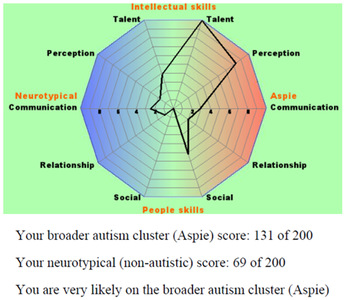NeuroQuest
Member
Hello everyone,
I'm John from British Columbia, Canada. Originally from the U.S., I've lived in Canada since late 2010 following my marriage to a lovely and intelligent Canadian woman.
Throughout my life, I've struggled with social difficulties. These challenges were so severe that I couldn't tolerate school, leading me to drop out after 9th grade despite having good intelligence and a love of learning. Nevertheless, I managed to build a professional career in museums and the arts, beginning as a teenage volunteer.
In my 40s, I started wondering if I might have Asperger's or be autistic. However, as you all know, the condition was not well understood then, and none of the literature I found seemed to align with my experiences.
About 5 or 6 years ago, I began writing a semi-autobiographical book. I became enormously frustrated that I couldn't explain my life in a way that made sense, even to myself. This led me to see a therapist experienced with autism. Within a few sessions, she suggested I was on the spectrum but wasn't technically qualified to provide a formal diagnosis.
After about three years and extensive searching for resources for a late-in-life diagnosis, I finally found a qualified professional. In December 2023, following extensive testing and consultation, I received a formal diagnosis of ASD Level I, with additional alexithymia. I was 64 years old.
Now, I'm working on letting go of the feeling that haunted me throughout most of my life – that I was somehow "broken." I'm developing a growing sense of self-compassion, something I haven't experienced before, and it's transformational.
I'm excited to join this forum and build a community of online friends and acquaintances. I'm interested in everyone's experiences and perspectives, but am especially keen to hear from others with a late-in-life diagnosis.
I'm John from British Columbia, Canada. Originally from the U.S., I've lived in Canada since late 2010 following my marriage to a lovely and intelligent Canadian woman.
Throughout my life, I've struggled with social difficulties. These challenges were so severe that I couldn't tolerate school, leading me to drop out after 9th grade despite having good intelligence and a love of learning. Nevertheless, I managed to build a professional career in museums and the arts, beginning as a teenage volunteer.
In my 40s, I started wondering if I might have Asperger's or be autistic. However, as you all know, the condition was not well understood then, and none of the literature I found seemed to align with my experiences.
About 5 or 6 years ago, I began writing a semi-autobiographical book. I became enormously frustrated that I couldn't explain my life in a way that made sense, even to myself. This led me to see a therapist experienced with autism. Within a few sessions, she suggested I was on the spectrum but wasn't technically qualified to provide a formal diagnosis.
After about three years and extensive searching for resources for a late-in-life diagnosis, I finally found a qualified professional. In December 2023, following extensive testing and consultation, I received a formal diagnosis of ASD Level I, with additional alexithymia. I was 64 years old.
Now, I'm working on letting go of the feeling that haunted me throughout most of my life – that I was somehow "broken." I'm developing a growing sense of self-compassion, something I haven't experienced before, and it's transformational.
I'm excited to join this forum and build a community of online friends and acquaintances. I'm interested in everyone's experiences and perspectives, but am especially keen to hear from others with a late-in-life diagnosis.


